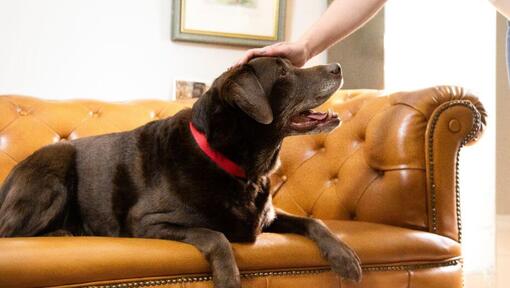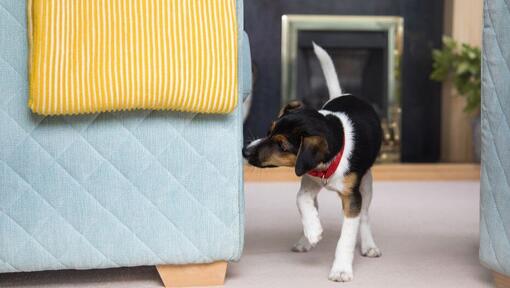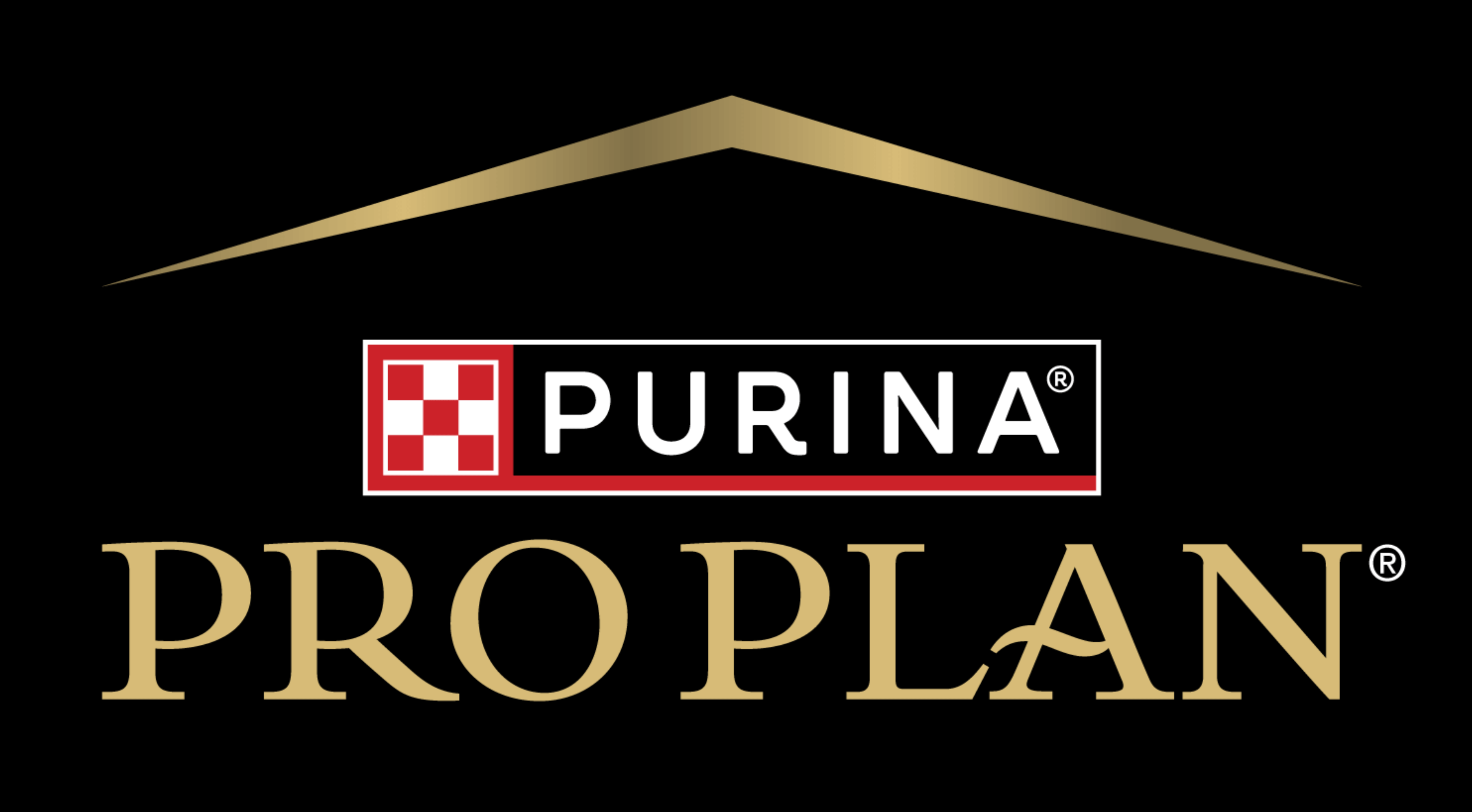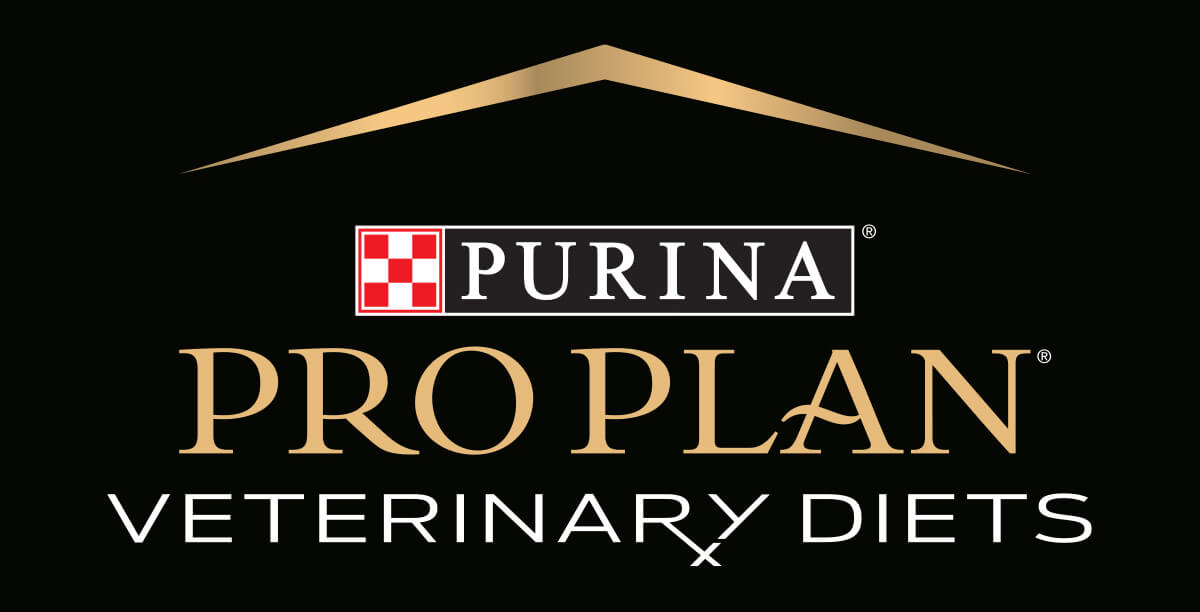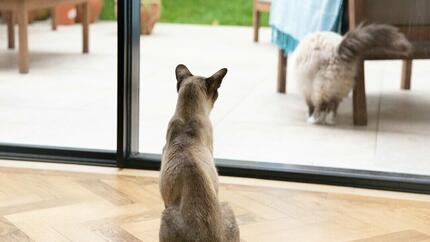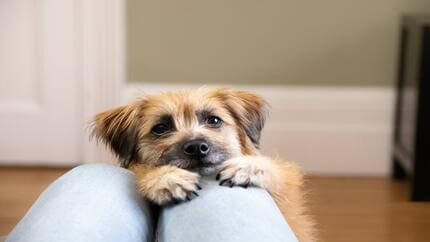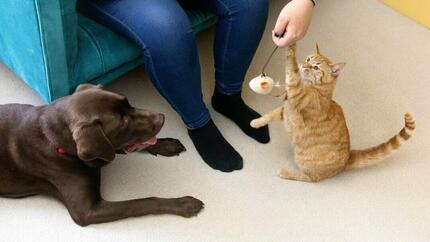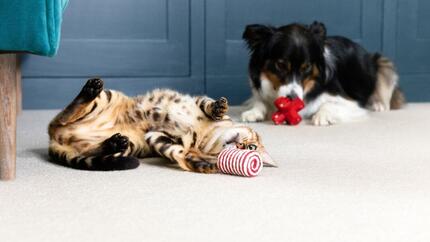
When we’re looking for coping mechanisms, we have to remember the basics; exactly what we do for our dogs; water, regular meal times, exercise, enrichment, rest… and kindness.
This month, we’re taking a practical approach to building resilience with the help of our dogs. You’re living with someone that’s no stranger to having restrictions placed on their day-to-day activities. You know that we’re really just living our dogs’ life, don’t you?! For those of us with no choice but to stay at home, we’re limited as to what we can eat, our exercise routine has been determined by someone else and our freedom of choice has been taken away; for our safety. When we’re looking for coping mechanisms, we have to remember the basics; exactly what we do for our dogs; water, regular meal times, exercise, enrichment, rest… and kindness.
In these challenging times, our dogs are an incredible source of companionship and comfort, but it’s not their responsibility to make us feel better. We owe it to them, and to ourselves, to take positive action so that we can both benefit from the time we have together.
Your dog is about to become your greatest teacher, if you let them.
Create a daily routine
It might sound boring, but we have to create a daily routine and stick to it. We’re all navigating a new reality that we didn’t ask for and we weren’t prepared for. With that comes a wave of change and uncertainty, two things we’re not designed to cope with.
For many of us, the fear and uncertainty can open old wounds and trigger responses that we believed were long buried. We feel like we’re spiralling out of control and that in itself can be terrifying. That’s a perfectly normal response, so your only job is to go easy on yourself, exactly as you would for your dog if they were frightened or anxious.
When you brought your dog home, whether as a pup or through rescue, they were in unchartered waters. They were navigating a new reality and I have no doubt that you did your absolute best to show them that you could be trusted, that they were safe and you started the way you meant to go on. Do the same for yourself, show yourself the same level of care and understanding.
Routine brings certainty and certainty is what we’re craving in these uncertain times. It works for our dogs and it will work for us too.
Keep it simple and create a routine around your new circumstances.
Make sure it includes healthy mealtimes, trips to fill up your glass of water (yes, water!), exercise with your dog (within the guidelines for your situation), enrichment (whatever your favourite in-house pastime is), a set time to go to bed and, of course, kindness towards yourself and those around you.
Make time for exercise
There are guidelines that must be adhered to, but within those guidelines we do have the autonomy we need to give our brains and/or body a workout with our canine family member.
If you’re allowed out for exercise, seize the opportunity.
If your usual outdoor time has been restricted, you can still dedicate that time to your dog. You can build a morning, afternoon and evening ‘exercise’ slot into your routine and I can assure you that it will brighten your day and your dog’s day.
As you’re scheduling the time, please ensure you don’t start a game with your dog just after a meal. Our vets don’t need us calling because we’ve encouraged post-din-dins-playtime and made our dogs poorly; they’re busy enough right now.
Interacting with your dog, playing games with them and teaching them will not only take your mind off everything that’s going on in the world it will give you a chance to de-stress. Stress lowers the capabilities of our immune system and your canine teacher can help you improve it, just through you being present and proactively enjoying your time together.
Below you can find the instructions for an indoor game that you can play with your dog right now and there are lots more ideas available from our partner Canine perspective. They have a new ‘Lockdown Corner’ which is dedicated to raising our energy with the help of our dogs.
Find my keys
This isn’t just a fun game; it’s potentially a game-changer. When we’re allowed out again, we might need help to get back into our old routines and I struggle to find my keys at the best of times.
Before you get started, make sure that your keys are easy for your dog to pick up. If you can attach something soft to the keyring, maybe a small soft toy or a handkerchief, you’re setting your dog up to succeed.
- First of all, sit with your dog and play a basic retrieve game with your keys. Just rattle them yourself, put them down and rattle them on the floor and praise your dog as they take an interest in picking them up. When they do, say ‘keys’ and offer lots of praise, take them from them with a drop/out cue and play again. The aim is for your dog to be comfortable picking up the keys and dropping them in your hands when you ask.
- If you gradually increase the distance between you and the keys, your dog will start to get used to picking them up and bringing them to you, just like a usual retrieve game, but arguably more useful!
- Make this an exciting, high energy and well-rewarded game so when your dog drops the keys in your hands, they’re paid well. As you’re making this high-energy for your dog, notice how you’re feeling and enjoy the respite from the stress you’re experiencing at the moment.
- As you’ve been playing, your dog will have started to pair the word ‘keys’ with the item they’re carrying, so we can now add the element of ‘find it’ to the game. Even if your dog is brilliant at this, remember that we want to be specific and introduce a ‘find the keys’ cue so that when we need their help, they know what we’re asking for. So, start at a beginner level, set your dog up to succeed and keep it fun.
- Leave the keys with a couple of other items and ask your dog to ‘find the keys’ which will show you whether they have understood the cue of ‘keys’.
- As you practice this in different places around the house, remembering to make it fun and keeping it well paid, your dog will be able to respond quickly, understanding what is being asked of them.
- Now you can discreetly hide your keys, wait a little while and then ask your dog to ‘find the keys’. If they don’t find them straight away or finds an alternative to keys, don’t worry, just ask again! If it’s quickly obvious that they’re not sure what you’ve asked them to do, just go back a step and practice that a bit more.
- When your dog can easily find your keys from anywhere in the house, it’s time to up your game. Head out into your garden, or try this on walkies. Start by ‘accidentally’ dropping your keys and encouraging your dog to pick them up for you. Do this a few times and then ‘accidentally’ drop your keys, say nothing, and see how your dog responds. Give lots of praise and a decent treat for a positive choice and if your dog decides you can pick up your keys, that’s ok too! You can try again when there’s less distraction and after some more practice of asking first.
If training doesn’t go to plan, don’t worry! It really doesn’t matter and it definitely isn’t something you need to get stressed out about. Yes, it can be frustrating but keep in mind that you have the written instructions, your dog doesn’t!
Take a step back, have a break and ask yourself ‘what else could I do to set them up to succeed?’.
If you’re struggling, ask yourself the same question. What could you do to help shift your energy from stress and anxiety to something more positive and productive so that you can set yourself up to succeed?
Written by Marie Yates, Director of Canine Perspective CIC. Marie was a finalist in Purina’s 2018 #BetterWithPets prize and you can find out more about her social enterprise here: https://canine-perspective.com/.
Want to find out more tips about living a happy and healthy life from your canine's perspective? Read our article on Enriching You and Your Dog’s Life.



